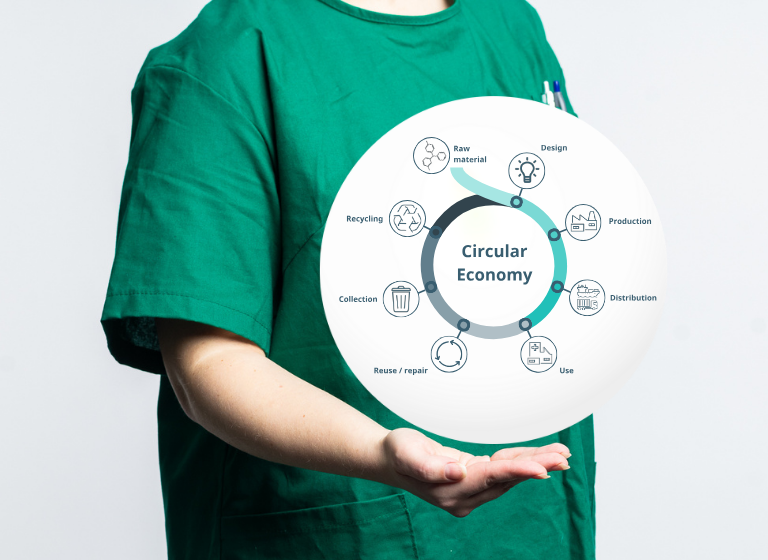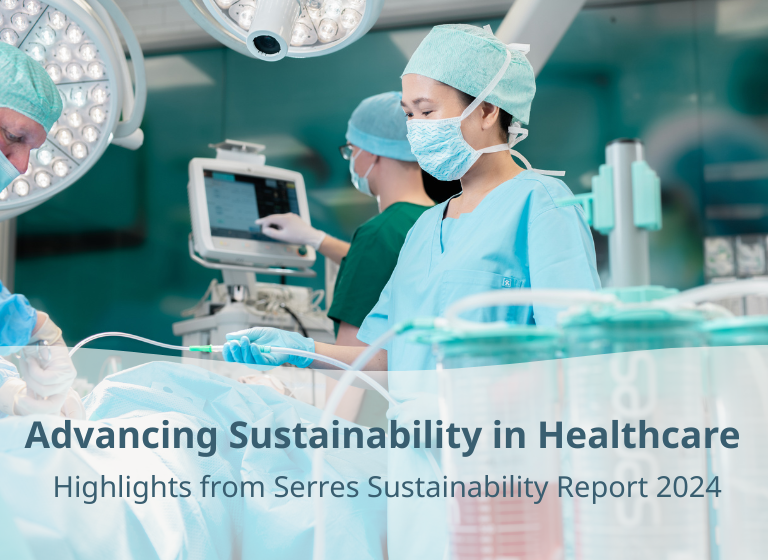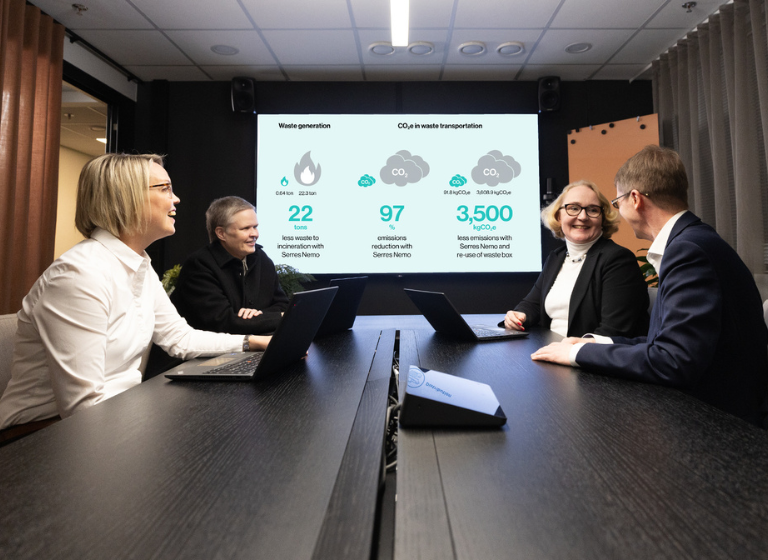Serres’ Circular Economy Initiatives and Healthcare Sustainability
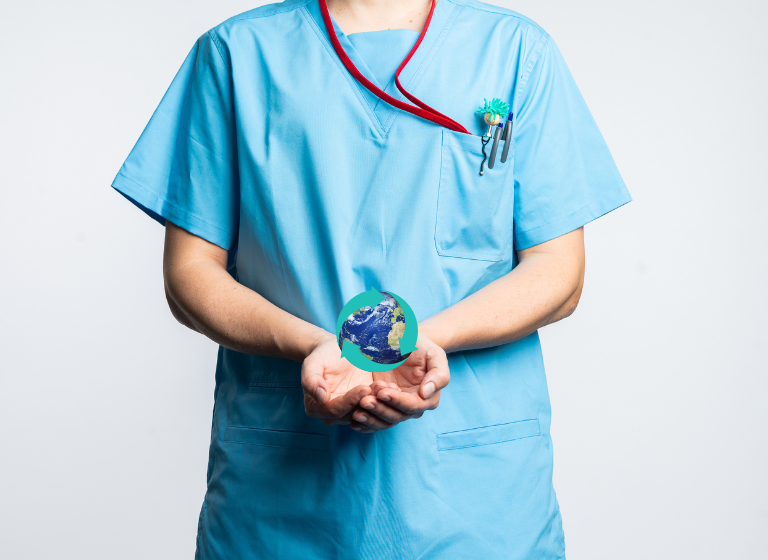
By 2025, the global healthcare sector is projected to use approximately 22 million tons of plastics annually, with the majority ending up in landfills or being incinerated. (1)
About one-third of hospitals’ general waste is plastics, it is estimated that almost 67 million tons of waste is generated. The current handling and disposal of waste greatly burdens the environment. (2) Due to these practices, a large amount of CO2 emissions is released to the environment. The healthcare sector is responsible for almost 5% of global emissions, a figure that can even reach 10% in some high-income nations. (3)
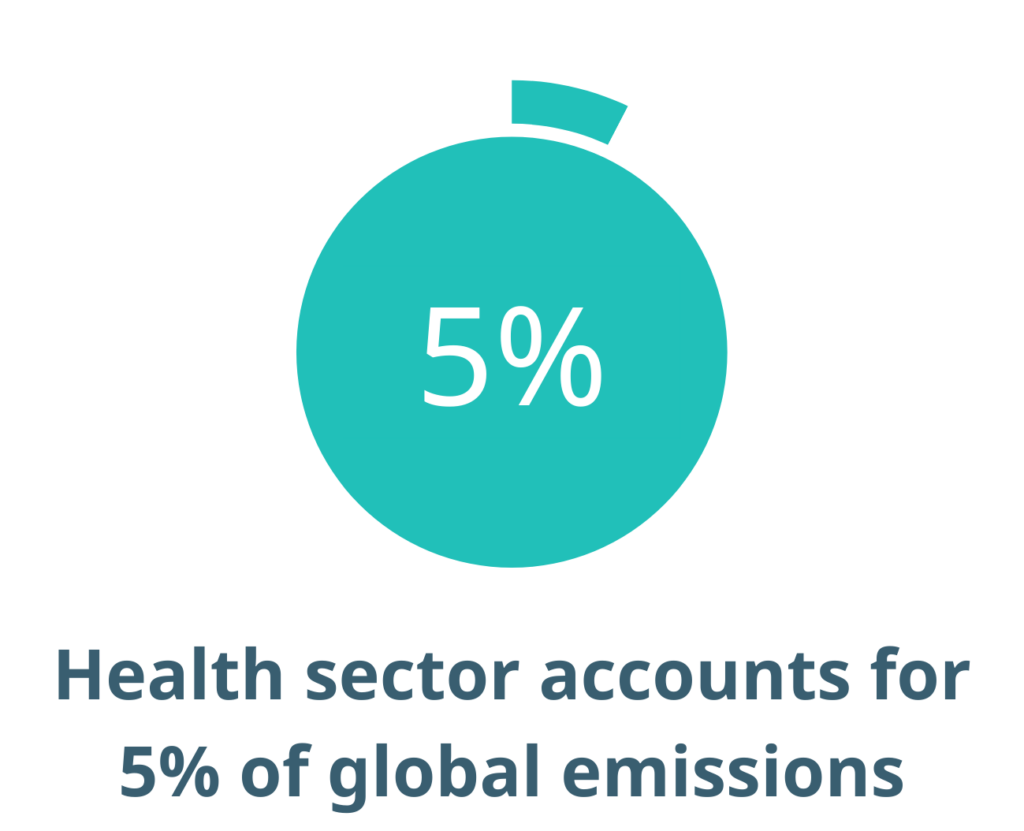
A circular economy approach in the healthcare sector significantly reduces the environmental impact of waste carbon emissions. In a circular economy, materials and products are used for as long as possible, waste is minimized, and resources are continually cycled back into the economy. The key principles of circular economy in healthcare are Reduce, Reuse, and Recycle.
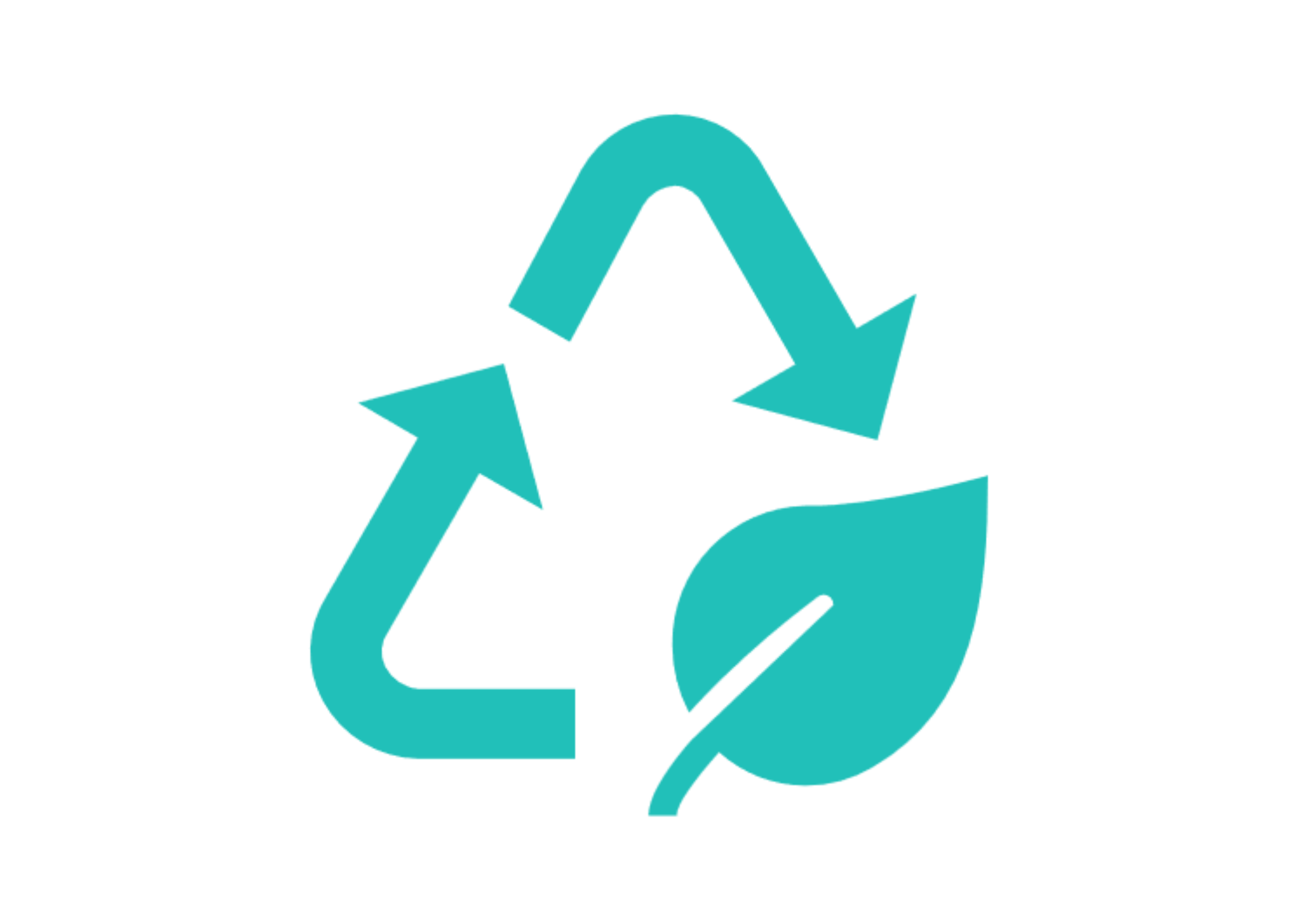
The circular economy in hospitals focuses on reducing waste by rethinking the design, use, and disposal of materials. It involves strategies like using recyclable or reusable packaging and products, reducing single-use items, and promoting sustainable procurement practices. Hospitals together with suppliers increasingly adopt these principles to minimize environmental impact, lower costs, and improve resource efficiency. This approach addresses waste management challenges and contributes to broader sustainability goals in the healthcare sector.
Circular economy at Serres
In 2023, we at Serres established a Circular Economy Center of Excellence jointly with our group and sister companies to accelerate the actions and collaborations to reduce waste, increase the amount of recycled material in our products and packaging, and enhance the recyclability of our end product life. In addition, we have two dedicated sustainability teams at both of our manufacturing sites in Finland.
Our core product, the Serres Suction bag, is used for collecting patient fluids during an operation. Our Suction system combines reusable canisters and single-use suction bags.
Over the years we have applied the ‘reduce’ principle when developing our suction bag. We have minimized the amount of virgin plastics while maintaining high-quality product performance in clinical use. Our dedication to using less plastics and optimizing packaging efficiency translates into the ability to fit 4 times more of our Serres Suction bags into the same space as comparable products. (4)
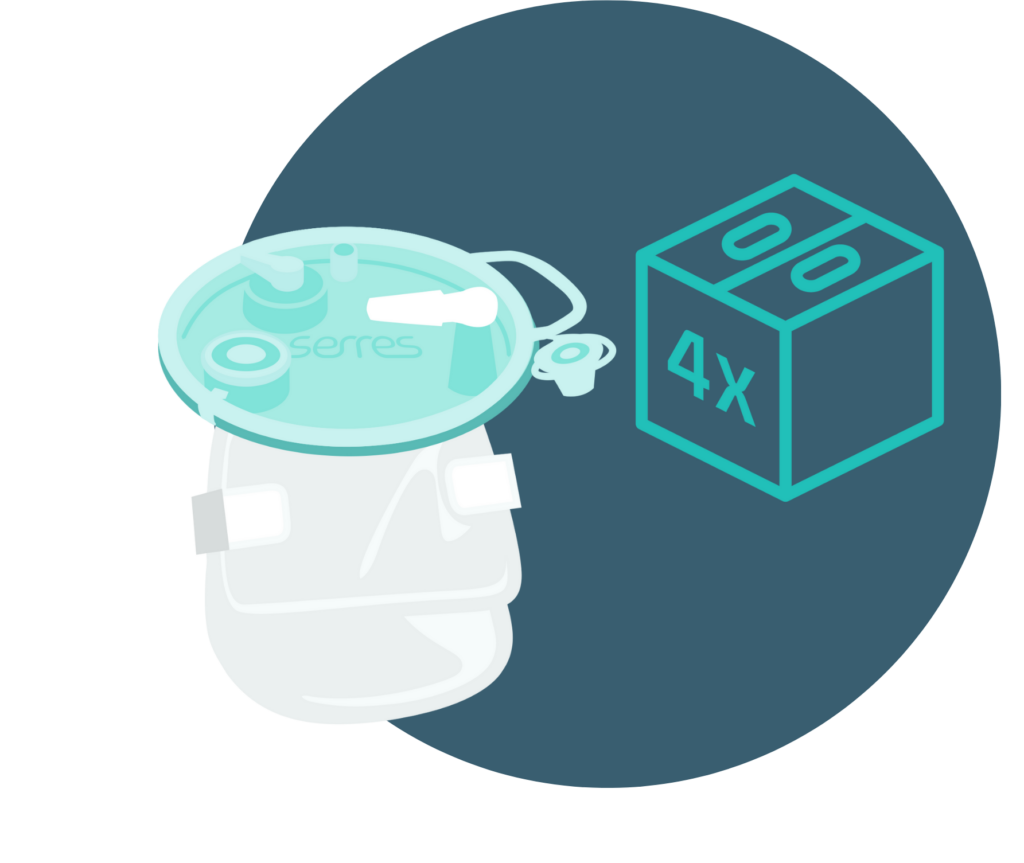
For nearly 20 years, we have embraced the ‘recycle‘ principle in our manufacturing. Since 2005, waste from our plastic film and lid production lines has been collected and sent to a third party for recycling.
The ‘reduce’ principle was central to the development of Serres Nemo, a suction bag emptying device designed to minimize waste from surgical fluid collection in hospitals. Disposing of full suction bags places a significant environmental burden, so our design team developed Serres Nemo to address this. By using Serres Nemo for fluid disposal, up to 97% less waste is transported for disposal and incineration.
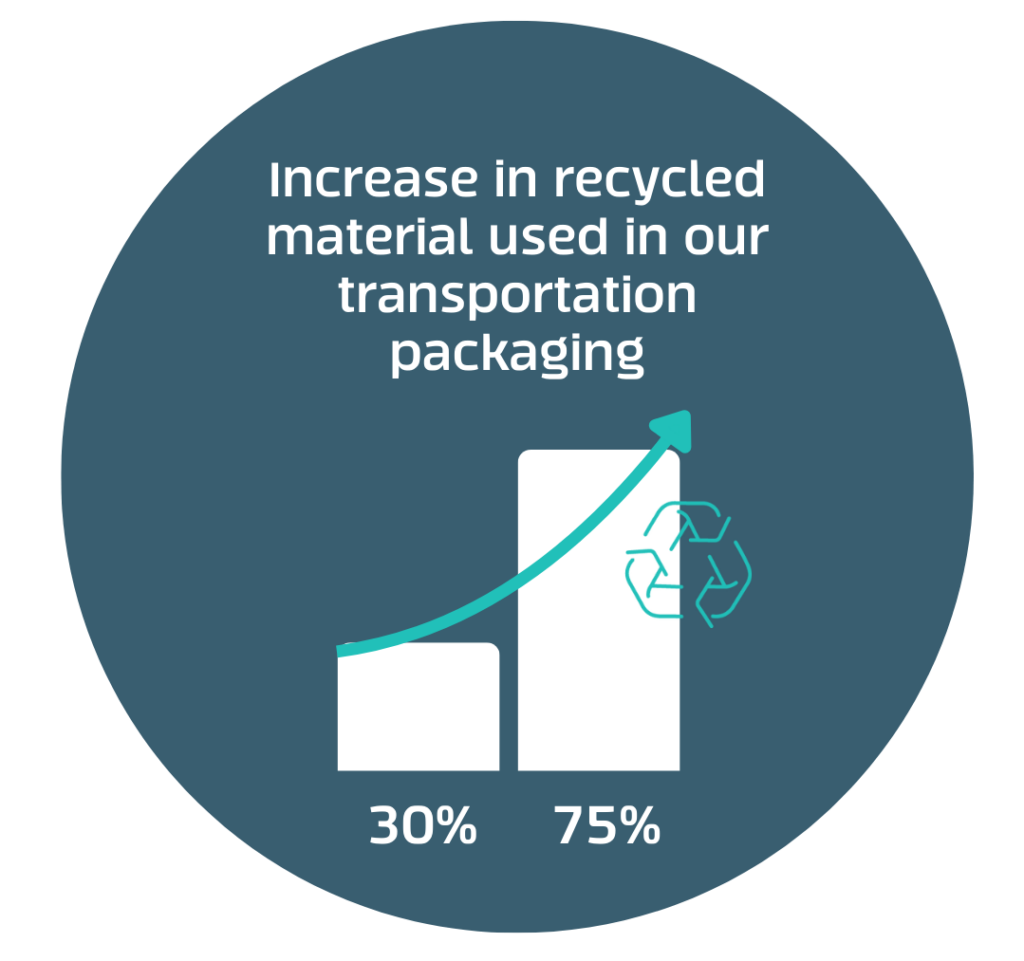
In 2023, we applied the ‘reduce’ principle when we launched an updated version of the Serres Nemo. The amount of water needed to flush the suction bag when using Serres Nemo was reduced by 15%, without any negative effect on the flushing efficiency.
In 2023, we increased the recycled material in our transportation packaging material from 30% to 75%.
In the future, we plan to expand these Reduce, Reuse and Recycle principles to cover our entire value chain.
Entering into strategic partnerships to accelerate the circular economy in the Serres value chain
Fostering circularity requires a collective effort, and one needs to approach collaboration on multiple fronts. We are actively seeking to join forces with partnerships to accelerate the circular economy throughout our entire value chain. The value chain includes key stakeholders, such as raw material and packaging suppliers, distributors, hospitals, waste management and recycling actors, research institutes, and policymakers. The desired state is to accelerate recycling and reuse in all states of the value chain.
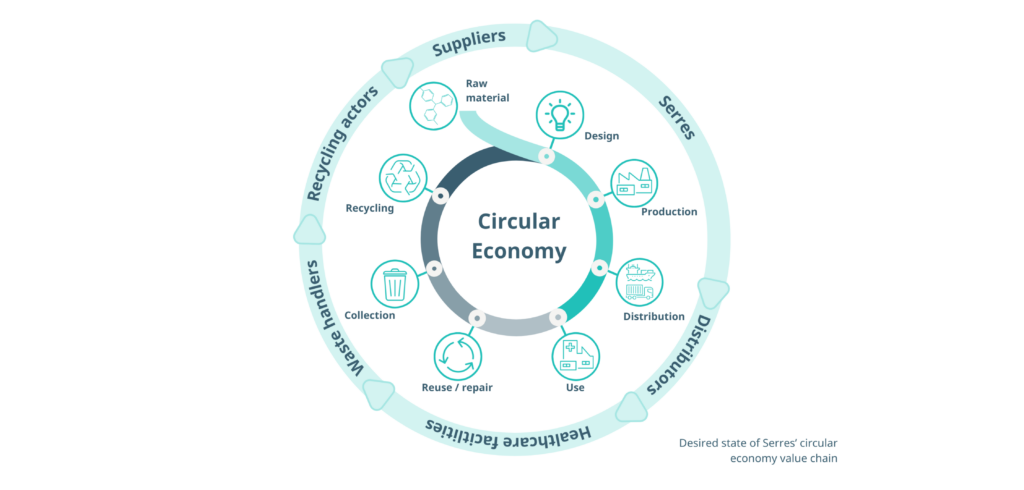
Recently, we have entered into collaboration with VTT, the Technical Research Centre of Finland. It is one of Europe’s leading research, development, and innovation organizations and it focuses on advancing cutting-edge technology and driving innovation across various industries.
The VTT-led PlasticsCircularity project, funded by Business Finland, boosts the circular economy and brings together companies and organizations to jointly collaborate and drive forward the recyclability of plastic products and packaging through cutting-edge recycling technologies and innovative business models. In the project, we collaborate with 10 partners in this ecosystem to transform used plastics into valuable resources rather than waste.
In 2023, Serres joined a European Union NextGenerationEU and Business Finland-funded OPENCO 2 research pilot to investigate the method of calculating circular economy benefits. Our objective was to acquire further insights into how the advantages of the circular economy can be distributed among various stakeholders within our value chain, focusing on end-of-life phases and different recycling methods.
We are eager to join forces through partnerships and find synergies to further drive circularity. Helping hospitals reach their net-zero targets and reduce waste from hospital operating rooms is at the heart of our sustainability agenda.
1) Healthcare Plastics Recycling Council
2) Let’s reduce single-use plastic in healthcare – ClimateHealth (caha.org.au)
3) Climate change and health: three grand challenges | Nature Medicine
4) Serres blog: Serres Suction Bags and Sustainability: Transforming Surgical Fluid Collection to a Safe And Sustainable Solution: Packaging & logistics efficiency comparison is based on market analysis & study on number of similar-use products in 1 package & pallet efficiency in trucks and containers. The study was conducted in 2023.
